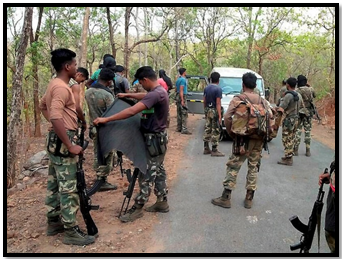CRIMINALISING DISSENT: MAHARASHTRA’S CONTROVERSIAL SECURITY BILL
Syllabus:
- GS-2- Freedom of speech and expression , Dissent and associated cases ,Judicial actions
Focus :
- The article critically examines Maharashtra’s proposed Special Public Security Bill, 2024, highlighting its vague definitions and potential to criminalise legitimate dissent and debate. It underscores the legal and constitutional concerns raised by the Bill and the importance of protecting civil liberties.
Source - IE
The Bill’s Provisions and Powers
Expansion of “Unlawful Activity”:
- The Bill extends the definition of unlawful activities beyond existing anti-terror laws such as the Unlawful Activities Prevention Act (UAPA), 1976.
- It includes activities perceived as “being a menace to public order,” “interfering with administration of law,” “generating fear and apprehension in public,” and “preaching disobedience of law.”
Targeting Urban Naxalism:
- Introduces the term “urban Naxals” into legal vocabulary, a term previously used politically to target students, writers, and activists.
- The Bill’s Statement of Objects and Reasons suggests an increasing urban presence of Naxalism, necessitating stringent measures.
| About UAPA (Unlawful Activities Prevention Act)-
Definition and Scope of “Unlawful Activities”:
Designation of Terrorist Organizations and Individuals:
Powers of Arrest and Detention:
Forfeiture of Property:
Special Courts for Fast-Track Trials:
|
Legal Concerns and Potential Misuse
Vague and Overbroad Definitions:
- The loosely worded descriptions in the Bill could encompass legitimate dissent, protests, or even criticism of the government.
- There is a risk that the Bill could be used to suppress free speech and civil liberties under the guise of maintaining public order.
Lack of Distinctions:
- The Bill does not adequately differentiate between active members of an organisation and individuals merely associated with it.
- It empowers the government to evict accused persons from premises and seize bank accounts even before a trial, posing a threat to due process and fair trial rights.
Judicial Precedents and Higher Bar for Stringent Laws
Judicial Caution:
- The Delhi High Court, in the context of the 2019 Delhi riots case, emphasised that stringent penal provisions must be construed strictly.
- The court underscored that terrorist activity must extend beyond the capacity of ordinary law enforcement agencies and should not be conflated with mere disturbances of law and order.
Supreme Court Rulings:
- In the Bhima Koregaon cases, the Supreme Court granted bail to several accused, highlighting that mere possession of literature propagating violence does not constitute an offence under UAPA.
- The SC has consistently called for a higher threshold for invoking stringent laws, reinforcing the need for careful and precise legislative drafting.
Implications for Democracy and Civil Liberties
Threat to Constitutional Rights:
- The Bill poses a risk to the constitutional pact between the state and the citizen that protects dissent and debate.
- By potentially criminalising legitimate forms of expression and protest, the Bill undermines the fundamental rights enshrined in the Indian Constitution.
Political Context and Legislative Process:
- The Bill was tabled just before the prorogation of the monsoon session of the assembly.
- With state elections approaching, the Bill has lapsed, but its potential revival remains a concern for advocates of civil liberties.
Conclusion
- Maharashtra’s Special Public Security Bill, 2024, represents a troubling expansion of state power with the potential to curtail fundamental freedoms.
- The vague definitions and broad scope of the Bill could lead to the criminalisation of legitimate dissent, posing a significant threat to democracy and civil liberties.
- As the state prepares for upcoming elections, it is imperative that the proposed law is not revived in its current form.
Source:Indian Express
Associated article
https://universalinstitutions.com/judicial-clarity-on-free-speech/
Mains Practice Question :
GS-2
“Critically analyze the implications of Maharashtra’s proposed Special Public Security Bill, 2024, on civil liberties and democratic rights in India. Discuss how vague definitions and broad provisions in anti-terror legislation can lead to the suppression of legitimate dissent and debate. Provide relevant judicial precedents to support your arguments.?”(250 Words)




